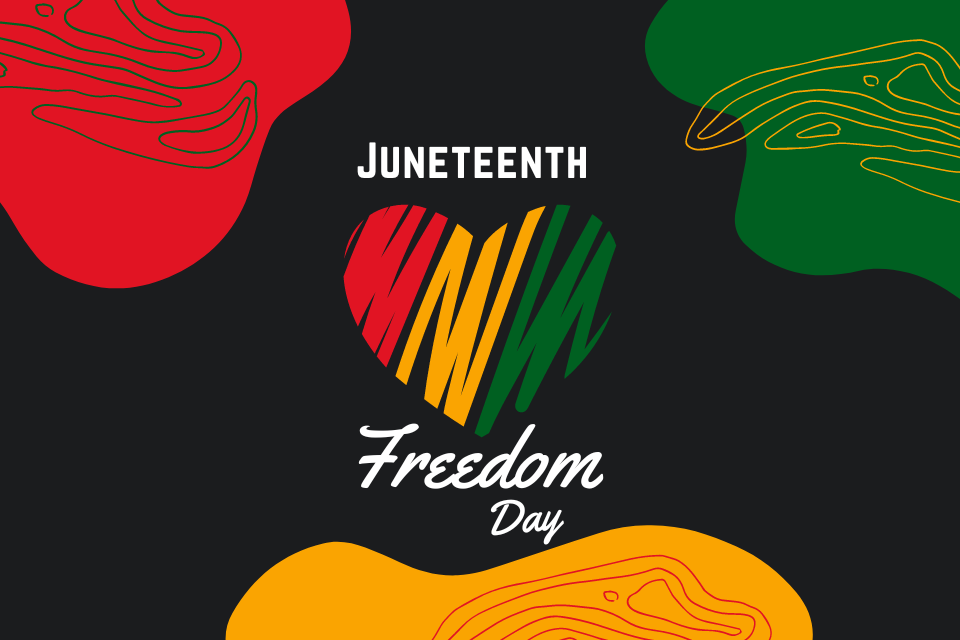
In 2021, President Biden signed a bill into law making Juneteenth a federal holiday. Literacy Pittsburgh’s offices will be closed on June 19th to honor the importance of this day. But what is the significance of Juneteenth? Instructor Tina Burns explains.
“Why are you off work on Juneteenth?” asked my daughter. “There is a meaningful reason!” I responded. Some Americans pose this question too. They wonder why post offices and banks are closed. Many people know why Christmas is a national holiday in the United States. Many people know why Labor Day is a national holiday in the United States. Let’s find out a bit more about June 19th or Juneteenth, and why it is now a national holiday in the United States.
“Juneteenth is a new national holiday celebrated on June 19th. On that date in 1865, two months after the end of the Civil War, a Union army general arrived in Galveston, Texas, and read a declaration that let slaves free” (Bliss 105). This explanation is what our students in Citizenship class learn during the unit on federal or national holidays in the textbook, Voices of Freedom. Students learn about this federal holiday along with many others to become familiar with our government and to prepare for the civics portion of their Naturalization test. However, let’s go a bit deeper into the significance Juneteenth holds.
The horrors of American slavery are well documented, including beatings, sexual assault, forced labor in brutal conditions, and murder. These situations were real for generations of enslaved people in America and haunt our collective consciousness to this day.
This persecution is something many of our students can relate to, both American-born and foreign-born. The legacy of slavery persists in bias and discrimination throughout our society - in housing, education, and the justice system. In addition, some of our immigrant and refugee students or their families have lived in captivity in their own countries, being mistreated, sexually assaulted, and forced to live in unsavory conditions. These students share with us their journey to America and what they or their families had to endure. They have faced their own liberation from tyranny.
For African slaves the Emancipation Proclamation meant liberation but it wasn’t immediate. Emancipation or ending slavery forced a change to the Constitution, known as the 13th Amendment. Not everyone, however, in Confederate Texas heard this important information. According to The Smithsonian, “…the Emancipation Proclamation was made effective in 1863, it could not be implemented in places still under Confederate control. As a result, in the westernmost Confederate state of Texas, enslaved people would not be free until much later. Freedom finally came on June 19, 1865, when some 2,000 Union troops arrived in Galveston Bay, Texas. The army announced that the more than 250,000 enslaved Black people in the state, were free by executive decree.” Until that point, 250,000 enslaved Black people were kept from their liberation and forced to stay in captivity longer.
The New York Times noted that on “June 17, 2021, President Biden signed the bill into law, making Juneteenth the eleventh holiday recognized by the federal government.”
This holiday is important. It commemorates the freedom of enslaved people. Many consider this commemoration a second Independence Day for America. This is a special day to be celebrated!
Literacy Pittsburgh (formerly Greater Pittsburgh Literacy Council) helps create better lives through learning. Recognized as a national leader in adult and family literacy, Literacy Pittsburgh is the largest provider of adult basic education in Allegheny and Beaver Counties. Last year, Literacy Pittsburgh helped more than 4,000 individuals acquire the skills needed to reach their fullest potential in life and participate productively in their communities. Literacy Pittsburgh provides free, personalized instruction in workforce readiness, high school diploma test preparation, digital literacy, English language learning, math, reading, and family literacy through one-to-one and small class instruction. Founded in 1982, it serves local adults through numerous neighborhood locations and its Downtown Pittsburgh Learning Center.


